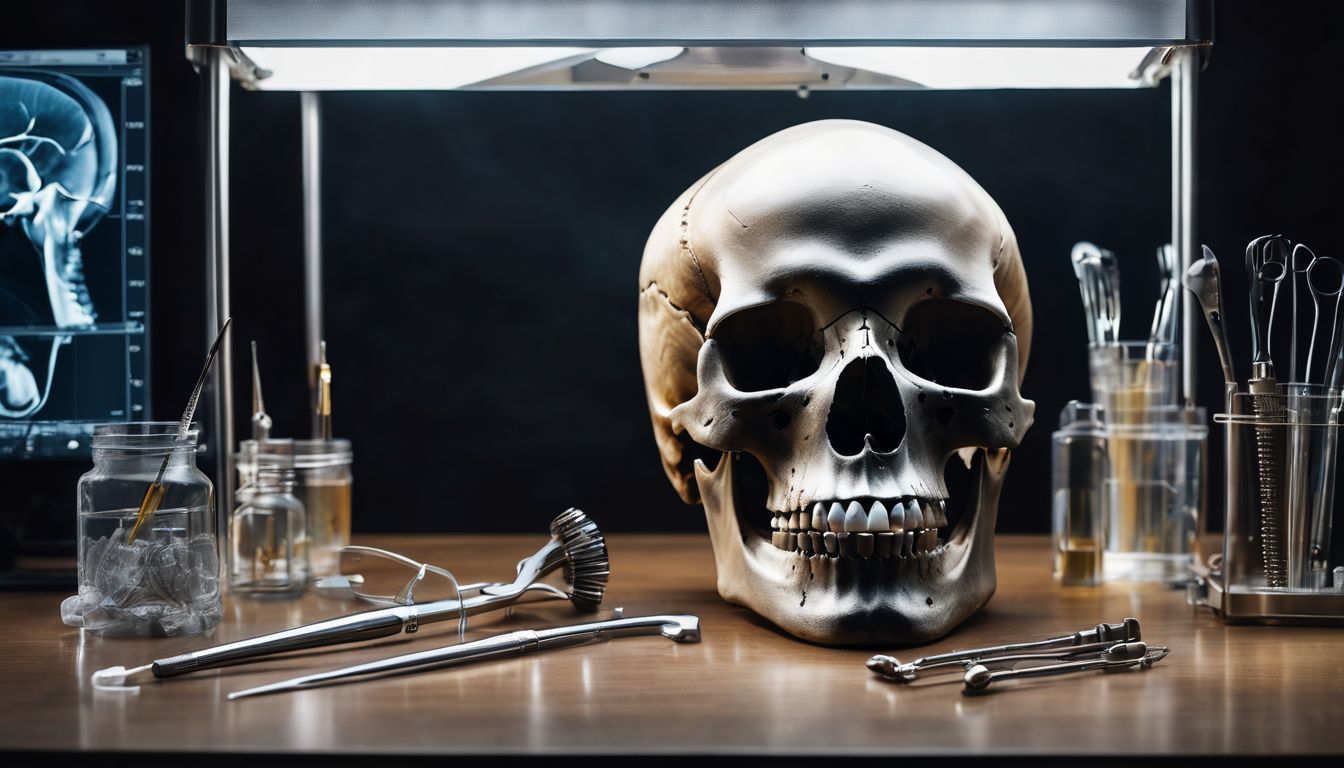Doest osteoporosis and dental treatment have something in common? If you’re struggling with osteoporosis, your bones may not be the only thing at risk. Osteoporosis can make oral health worse and even complicate dental care. This blog post will guide you through the challenges of dental treatment when dealing with bone density issues.
Keep reading to discover how to protect your smile despite osteoporosis.
Key Takeaways
- Osteoporosis makes bones weak, which can also make dental health worse and healing after dental work slower.
- Some drugs for osteoporosis, like bisphosphonates, might cause jaw problems after getting teeth pulled or other mouth injuries.
- Tooth implants can be harder to do if someone has osteoporosis because the bone might not hold the implant well.
- Dentists and doctors should talk a lot to plan safe care for people with osteoporosis who need dental work.
- It’s important for patients to keep their mouth clean and eat foods with calcium and vitamin D to help their bones stay strong.
Osteoporosis and its Effects on Oral Health
Osteoporosis can increase the risk of osteonecrosis of the jaw with certain medications, as well as lead to dental complications and delayed healing. Additionally, bone density issues can impact the success of dental implants.
Risk of osteonecrosis of the jaw with certain medications
Some medications for osteoporosis, like bisphosphonates, can lead to a rare but serious problem called medication-related osteonecrosis of the jaw (MRONJ). This happens when the jawbone starts to weaken and die after minor injuries, such as getting a tooth pulled.
The risk is higher if you take these drugs for a long time or at high doses.
Good oral hygiene is important if you are on these medicines. Keep your dentist in the loop about any drugs for bone health. They might choose different ways to care for your teeth that lower the chance of hurting your jawbone.
Always tell them right away if your mouth or jaw starts hurting after dental work while taking these meds.
Increased risk of dental complications and delayed healing
Osteoporosis brings a higher chance of dental problems and slower healing after dental procedures due to reduced bone density. This can elevate the risk of tooth loss, gum disease, and ill-fitting dentures because of compromised jawbone.
Low bone density also leads to less favorable outcomes from oral surgery and complicates tooth extractions, implants, and other dental treatments. Osteoporosis medications may further increase the vulnerability to medication-related osteonecrosis of the jaw (MRONJ), impacting healing after dental procedures.
The impact on oral health is significant as osteoporosis not only increases the risk of complications during dental treatments but also delays post-treatment healing. The compromised bone density in patients with osteoporosis makes them more prone to tooth loss, delayed recovery from oral surgeries, and potential development of MRONJ following certain medical interventions.
Impact on dental implants
When considering osteoporosis and its effects on oral health, it’s crucial to recognize the impact it can have on dental implants. Reduced bone mineral density associated with osteoporosis can affect the success of dental implant procedures.
Low bone density may lead to decreased implant stability and integration, potentially resulting in implant failure or complications during the healing process. The risk of these issues emphasizes the importance of thorough assessment and personalized treatment planning for patients with osteoporosis undergoing dental implant procedures.
The potential challenges related to low bone density highlight the need for careful consideration and evaluation before proceeding with dental implants in individuals with osteoporosis.
Management and Prevention for Dental Patients with Osteoporosis
Dentists and doctors must communicate to develop a comprehensive treatment plan for patients on osteoporosis medications. Conservative surgical techniques can help minimize the risk of complications, while dental implants may require special considerations in patients with osteoporosis.
Importance of communication between doctor and dentist
Good communication between doctors and dentists is crucial for patients with osteoporosis. Sharing medical histories, including medication usage, ensures that dental procedures are tailored to the patient’s specific needs.
This collaboration helps in identifying potential risks of complications related to bone density or medications, thus enabling the dentist to formulate appropriate treatment plans.
Additionally, coordinating care can help manage any adverse effects of osteoporosis medications on oral health and reduce the risk of developing medication-related osteonecrosis of the jaw (MRONJ).
Effective communication ensures better outcomes for patients undergoing dental treatments while managing their osteoporosis.

Preventive measures for patients on osteoporosis medications
- Patients on osteoporosis medications should inform their dentist about their medical history and the specific medication they are taking.
- Regular dental check – ups can help identify any potential issues early on.
- Dentists may consider alternative treatments or adjust dental procedures based on the patient’s osteoporosis medication.
- It’s essential for patients to maintain good oral hygiene and follow a balanced diet rich in calcium and vitamin D to support bone health.
- Dentists should carefully evaluate the risks and benefits of any dental procedures for patients on osteoporosis medications, considering potential impacts on bone density and healing.
Conservative surgical techniques for tooth extractions or bone surgery
As we consider preventive measures for patients on osteoporosis medications, it’s important to understand conservative surgical techniques for tooth extractions or bone surgery. Here are some crucial strategies:
- Use smaller incisions and minimize tissue trauma during surgeries to promote faster healing and reduce the risk of complications.
- Employ specialized instruments designed to minimize bone loss and preserve surrounding healthy tissues during tooth extractions or bone surgeries.
- Utilize advanced imaging technology such as cone-beam computed tomography (CBCT) to precisely plan and execute surgical procedures, reducing the risk of errors.
- Consider alternative non – surgical interventions, such as periodontal maintenance therapy, when appropriate, to manage oral health conditions while minimizing invasive procedures on compromised bone density.
- Collaborate closely with medical professionals managing the patient’s osteoporosis treatment to tailor surgical techniques and medication management for optimal outcomes in oral health and overall well-being.
Considerations for dental implants and bisphosphonate therapy
When considering dental implants and bisphosphonate therapy for patients with osteoporosis, it’s important to assess the risk of medication-related osteonecrosis of the jaw (MRONJ) due to long-term use of antiresorptive agents.
Patients on bisphosphonate therapy may experience delayed healing and have an increased risk of complications after oral surgery, including dental implant placement. Dentists should carefully evaluate the patient’s medical history, bone density, and overall oral health before proceeding with dental implant procedures in order to minimize potential risks associated with osteoporosis and antiresorptive medications.
To provide effective care for patients undergoing dental implant procedures while on bisphosphonate therapy or managing osteoporosis, dentists must communicate closely with physicians to ensure a comprehensive understanding of the patient’s medical management.
FAQs
1. How does osteoporosis affect teeth and gums?
Osteoporosis can make your jaw bone weaker. This means you might have more tooth decay, gum problems, or tooth fractures.
2. Can I still get dental implants if I have osteoporosis?
Yes, but since osteoporosis makes bones weaker, your dentist needs to check if your jaw bone can hold the implants well.
3. What is MRONJ and how is it linked to osteoporosis treatment?
MRONJ stands for medication-related osteonecrosis of the jaw. It’s a rare problem where the jawbone gets hurt after minor injuries like tooth extractions. This can happen in people taking certain medications for treating osteoporosis.
4. Should someone with low bone density be worried about dental treatments?
If you have low bone density or conditions like osteopenia, which leads up to osteoporosis, talk to your dentist before getting treatments so they can avoid complications like MRONJ after procedures such as tooth extraction or placing dental implants.
Conclusion
In conclusion, osteoporosis can have a significant impact on oral health. Dental patients with osteoporosis need specialized care to prevent complications such as medication-related osteonecrosis of the jaw and delayed healing.
Effective communication between medical and dental professionals is crucial in managing and preventing oral health issues associated with osteoporosis. As their is a surprising link between osteoporosis and dental treatment. By understanding the implications of reduced bone density, dentists can provide tailored treatment plans to ensure optimal oral health for patients with this condition.



